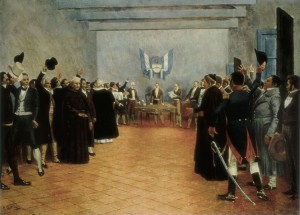Argentina 200: the Declaration of Independence
July 8, 2016
Tomorrow, July 9, Argentines will celebrate the 200th anniversary of the signing of their nation’s declaration of independence. President Mauricio Macri will lead Nueve de Julio (Ninth of July) ceremonies at the house in northwestern San Miguel de Tucumán where the signing took place on July 9, 1816. Other dignitaries scheduled to attend include former Spanish King Juan Carlos and leaders from several Latin American countries.

Representatives signed Argentina’s declaration of independence at the Congress of Tucumán on July 9, 1816. Credit: © Everett/Shutterstock
Earlier in the week, Argentine lawmakers and political leaders met at Tucumán to commemorate the bicentennial. Emilio Monzó, speaker of the lower house, called the gathering “an unprecedented event in the history of our country that representatives from the National Congress travel to the place where our country was born.” Senate leader Federico Pinedo, Tucumán Governor Juan Manzur, and Argentine Vice President Gabriela Michetti also attended the midweek commemoration.
The 1816 signing of the declaration of independence took place during a turbulent period in Argentina’s history—a period, in fact, before the nation was called Argentina. It was then known as the United Provinces of the Río de la Plata, and it covered only the current nation’s northern half above Patagonia. The declaration of independence also came six years after the formation of a government independent of Spain on May 25, 1810, in Buenos Aires. The area had been part of a Spanish colony since the late 1500’s.
After establishing self-rule in 1810, it took awhile to unite Buenos Aires with the various Argentine provinces. Eventually, provincial representatives met at the Congress of Tucumán on July 9, 1816, and declared their nation’s independence. The new nation had a rough go of it, however, suffering through a civil war and decades of dictatorship before the constitution of 1853 established a republic, which was renamed Argentina in 1860. The nation grew to include Patagonia in 1881.


